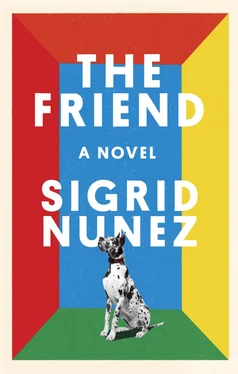• • •
Man and dog. Did it really all begin, as animal experts think, with nursing mothers taking orphaned wolf cubs to their breasts to suckle along with their babies? And doesn’t this fit nicely with the myth of the twin founders of Rome? Romulus and Remus, abandoned at birth, warmed and suckled by a she-wolf.
• • •
A pause here to wonder why we call a womanizer a wolf. Given that the wolf is known for being a loyal, monogamous mate and devoted parent.
• • •
I like that the Aborigines say dogs make people human. Also (though I can’t remember who said it): The thing that keeps me from becoming a complete misanthrope is seeing how much dogs love men.
• • •
Oversensitive to smells in general and squeamish about the human body, Ackerley was not put off by any scent of Tulip’s, not even from her anal glands, and saw prettiness even in the way she took a shit.
He writes less about her excretory habits than about her sex life. But that’s still quite a lot. And it’s the details. . . .
“Liquids and Solids” that chapter is called.
Though I always walk Apollo on a leash, I worry, just as Ackerley did, that a dog doing its business in the street—especially a big dog—could get hit by a car. Unfortunately, Apollo often squats a dangerous distance from the curb. I cannot, like Ackerley, solve the problem by letting Apollo use the sidewalk, even if, unlike Ackerley, I am always diligent in cleaning up the mess. My solution, whenever Apollo positions himself far enough from the curb to be in harm’s way, is to position myself between him and oncoming traffic. It’s true that now I’ve only put myself in harm’s way, but I figure, I hope not too innocently, that a driver will take greater care to avoid hitting a human being. Manhattan drivers are not a patient lot. Many an inconvenienced one has cursed me. But there are others, I know, who would’ve slowed down anyway, as so many pedestrians do, to stare.
In “How to Be a Flâneur,” you said you did not consider a long walk with a dog genuine flânerie because it was not the same as aimless wandering, and being responsible for a dog prevented a person from falling into abstraction. These days I spend so much time walking Apollo I can’t imagine going out just to walk by myself. What prevents me from falling into abstraction, though, or doing much thinking at all, is the way he draws attention. I don’t welcome strangers’ attention at any time, but although Apollo shows no sign of being bothered by the lack of privacy when he takes a shit I find these moments especially trying. Worst of all is being watched while I’m cleaning up after him, which seems to give a certain type of person a charge. People comment on the size of his turds as if I were not standing right there with pail and shovel (in themselves the cause of much glee, though I was actually quite pleased with myself for coming up with the idea of using a child’s sand pail, lined with a plastic bag, and a small garden trowel).
I feel sorry for you, someone says (grinning). Or: I love dogs but I could never do what you’re doing.
A few people have chided me for having such a dog at all: Big dogs don’t belong in the city!
I think it’s cruel, said one woman. Keeping a dog that size cooped up in an apartment.
Oh, but we’re just down for the day, I sang back at her. We fly home to the mansion tomorrow.
(Yes, of course, there are also nice people, above all other dog owners, any number of people who either mind their own business or say nice, friendly, intelligent things. But we all know niceness is never as interesting to write, or read, about.)
Liquids: When I see the gallons pouring out I’m grateful that he doesn’t lift his leg like most male dogs; instead of a hubcap he might drench a window.
Solids: enough said.
And there’s something between liquids and solids, the curse of large breeds. I have to mop his face several times a day. I call it swabbing the decks.
• • •
Rather than take him to his old vet, which would’ve meant finding a way to transport him to Brooklyn, I find one within walking distance of home. He is good with Apollo, but I am wary of him, the sort of man who speaks to women as if they are idiots and to older women as if they are deaf idiots.
When I tell him that Apollo never plays with other dogs, not even at the dog park, he says, Well, he’s not so young anymore, is he. I’m sure you don’t run and jump around the way you used to, either.
He shrugs when he hears the whole story. People throw pets out all the time, he says. It’s the dogs who’d die for the owners, not vice versa. (Obviously he has not read Ackerley.) Doesn’t the divorce rate tell us just how much the loyalty of a human being is worth? he says in a tone I find disquieting.
Someone once told me that many vets tend to be irritable because their profession exposes them to a particularly wide swath of human silliness—much of it, no doubt, in the form of anthropomorphism. I remember one who rolled his eyes when I said that my cat purred all the time so he must be happy. Purring is just a noise they make, it does not mean they’re happy , he snapped.
This one tells me bluntly that although Apollo is in pretty good shape for his age he won’t be long-lived. And given his arthritis, he says, believe me he wouldn’t want to be. Whatever you do, don’t let him gain weight.
He shakes his head at the botched ear job and points out what else makes him a less-than-perfect specimen of the breed: chest and shoulders too broad in relation to hindquarters; neck not quite pure white, and not quite the right distribution of black patches elsewhere on the body; eyes a little too close; jaws a little too wide; legs on the thick side. Powerfully built but stocky overall, lacking true elegance.
He has no trouble believing that the dog is in mourning for his previous owner and that his emotions have been exacerbated by too many changes in his environment. (How would you feel? he asks roughly, as if this were a thought I would never have arrived at by myself.) I tell him about the howling, and about the awful new symptom that seems to have replaced it: Now and then Apollo is seized by a kind of fit. He looks all around as if befuddled. Then, tail clamped between legs, he crouches as close to the floor as possible without actually lying down. It’s as if he’s trying to make himself as small as he can. Then the shakes begin. For periods that last from a few minutes to as long as half an hour, he cowers and shivers uncontrollably.
Anyone would say he thinks something terrible is about to happen to him, I tell the vet, keeping to myself that these attacks are so disturbing to watch that they sometimes bring me to tears.
There are drugs to treat canine anxiety and depression, but this vet is no fan of them. It can take weeks for a drug to become effective, he says, and often it turns out not to be effective at all.
Let’s leave that as a last resort, he says. For now, don’t ever leave him alone too long, and be sure you talk to him. Exercise him as much as possible. You might also try massage, if he’ll let you. Just don’t expect him to change into Mr. Happy Dog. He may never recover, no matter what you do. And you’ll never know why. It’s not just that you don’t know his history. People think dogs are simple, and we like to believe we know what goes on in their heads. But in fact we’re finding out that dogs are a lot more mysterious and complicated than we ever thought, and unless they develop our language we’ll never know them at all. Which goes for any animal, of course.
He’s a good dog, but I have to warn you, he says. You’re a little lady, he must outweigh you by eighty pounds. (This was flattering.) The way to deal with these large powerful breeds is to keep them from knowing the truth, which is that you can’t really make them do anything they don’t want to do.
Читать дальше












